19春六英下(PEP)写作;小学写作技巧:英文增加文采窍门(英语作文写作技巧)
小学英语作文写作技巧及范文
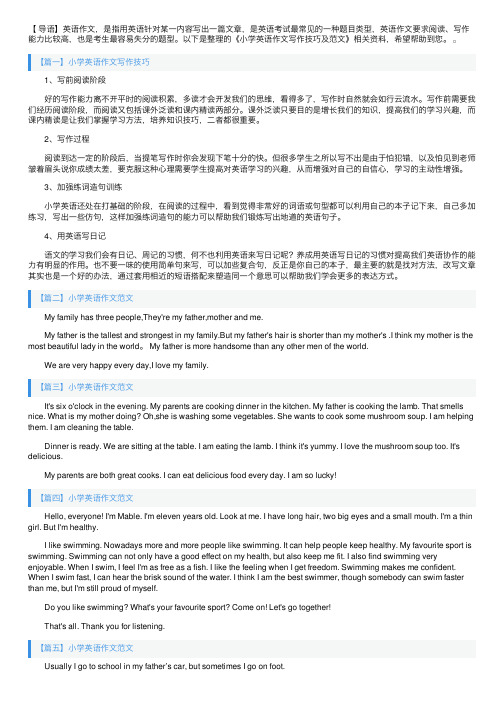
【导语】英语作⽂,是指⽤英语针对某⼀内容写出⼀篇⽂章,是英语考试最常见的⼀种题⽬类型,英语作⽂要求阅读、写作能⼒⽐较⾼,也是考⽣最容易失分的题型。
以下是整理的《⼩学英语作⽂写作技巧及范⽂》相关资料,希望帮助到您。
【篇⼀】⼩学英语作⽂写作技巧 1、写前阅读阶段 好的写作能⼒离不开平时的阅读积累,多读才会开发我们的思维,看得多了,写作时⾃然就会如⾏云流⽔。
写作前需要我们经历阅读阶段,⽽阅读⼜包括课外泛读和课内精读两部分。
课外泛读只要⽬的是增长我们的知识,提⾼我们的学习兴趣,⽽课内精读是让我们掌握学习⽅法,培养知识技巧,⼆者都很重要。
2、写作过程 阅读到达⼀定的阶段后,当提笔写作时你会发现下笔⼗分的快。
但很多学⽣之所以写不出是由于怕犯错,以及怕见到⽼师皱着眉头说你成绩太差,要克服这种⼼理需要学⽣提⾼对英语学习的兴趣,从⽽增强对⾃⼰的⾃信⼼,学习的主动性增强。
3、加强练词造句训练 ⼩学英语还处在打基础的阶段,在阅读的过程中,看到觉得⾮常好的词语或句型都可以利⽤⾃⼰的本⼦记下来,⾃⼰多加练习,写出⼀些仿句,这样加强练词造句的能⼒可以帮助我们锻炼写出地道的英语句⼦。
4、⽤英语写⽇记 语⽂的学习我们会有⽇记、周记的习惯,何不也利⽤英语来写⽇记呢?养成⽤英语写⽇记的习惯对提⾼我们英语协作的能⼒有明显的作⽤。
也不要⼀味的使⽤简单句来写,可以加些复合句,反正是你⾃⼰的本⼦,最主要的就是找对⽅法,改写⽂章其实也是⼀个好的办法,通过套⽤相近的短语搭配来塑造同⼀个意思可以帮助我们学会更多的表达⽅式。
【篇⼆】⼩学英语作⽂范⽂ My family has three people,They're my father,mother and me. My father is the tallest and strongest in my family.But my father's hair is shorter than my mother's .I think my mother is the most beautiful lady in the world。
小学如何写英语作文的方法和技巧
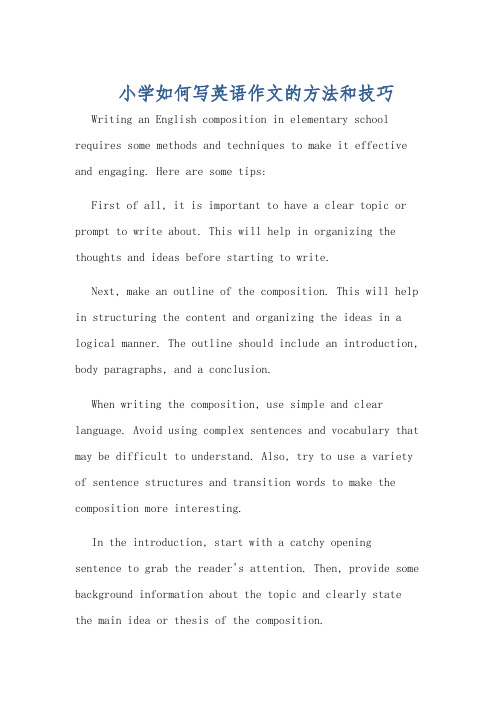
小学如何写英语作文的方法和技巧Writing an English composition in elementary school requires some methods and techniques to make it effective and engaging. Here are some tips:First of all, it is important to have a clear topic or prompt to write about. This will help in organizing the thoughts and ideas before starting to write.Next, make an outline of the composition. This will help in structuring the content and organizing the ideas in a logical manner. The outline should include an introduction, body paragraphs, and a conclusion.When writing the composition, use simple and clear language. Avoid using complex sentences and vocabulary that may be difficult to understand. Also, try to use a variety of sentence structures and transition words to make the composition more interesting.In the introduction, start with a catchy opening sentence to grab the reader's attention. Then, provide some background information about the topic and clearly state the main idea or thesis of the composition.In the body paragraphs, present the supporting details and examples to develop the main idea. Each paragraph should focus on a specific point and provide relevant information to support it.In the conclusion, restate the main idea and provide a summary of the key points discussed in the composition. It is also a good idea to end with a thought-provoking statement or a call to action.After writing the composition, it is important to proofread and edit it for any grammatical or spelling errors. It may also be helpful to have someone else read the composition and provide feedback.小学生写英语作文的方法和技巧包括以下几点:首先,要有一个清晰的主题或提示。
小学英语写作高分技巧

小学英语写作高分技巧随着全球化的发展,英语已经成为一门越来越重要的国际语言。
在小学阶段,掌握英语写作的技巧不仅可以提高学习成绩,还可以培养创造力和表达能力。
本文将为你介绍一些小学英语写作的高分技巧。
一、扩大词汇量在写作中,拥有丰富的词汇量是非常重要的。
我们可以通过阅读英语故事书、报纸、杂志等多种材料来扩大自己的词汇量。
在记忆单词时,可以编写自己的单词卡片,并通过反复复习来巩固记忆。
二、合理使用句型灵活运用不同句型可以给文章增色不少。
在写作中,我们可以多运用一些基础的句型,比如简单句、复合句和并列句等。
此外,也可以尝试运用一些感叹句、疑问句和条件句等来增加文章的变化性。
三、注意语法和拼写在写作时,语法和拼写是需要格外注意的。
一些常见的语法错误包括主谓一致、时态一致以及代词的使用等。
在拼写方面,我们可以通过多写多读来提高自己的拼写水平。
同时,在写作完成后,应该进行仔细检查,以确保文章中没有拼写和语法错误。
四、注重段落结构一篇好的文章应该具有良好的段落结构。
每个段落应该只讨论一个主题,并且要有逻辑性。
在写作中,我们可以通过使用连接词和过渡词来使段落之间的关系更加明确和流畅。
五、提供具体的细节和例子为了使文章更加生动有趣,我们可以在写作时提供具体的细节和例子。
比如,如果写一篇关于我的宠物的文章,可以用形容词来描述宠物的外貌特征,也可以分享与宠物一起的有趣经历。
六、注意提供结论一篇好的文章应该有一个清晰的结论。
结论部分通常是文章的最后一段,可以概括文章的主要内容,并提出自己的观点或建议。
总结:小学英语写作是培养学生语言表达能力的重要途径。
通过扩大词汇量,合理使用句型,注意语法和拼写,注重段落结构,提供具体的细节和例子,以及注意提供结论,我们可以提高小学英语写作的水平。
同时,坚持反复练习和不断积累经验也是非常重要的。
希望以上的技巧能够对你提高小学英语写作有所帮助。
参考词汇:1. vocabulary –词汇量2. sentence structure –句子结构3. grammar –语法4. spelling –拼写5. details –细节6. conclusion –结论7. expression –表达能力。
【通用版】2020届小升初英语复习:写作技巧-小学写作技巧:英文增加文采窍门(英语作文写作技巧)

小升初英语
小学写作技巧:英文增加文采窍门(英语作文写作技巧)
如果说第一、二步是对文章的构思,第三、四步骤则是真正地“写”了,用词是否贴切,文法是否正确,句式是否多变,文采是否有生气,关系到写作者的语言功底和水平,但也有些窍门,以下这几点可以供你参考:
1.在整篇文章中,避免只是用一两个句式,要灵活运用各种句式。
如倒装句、强调句、省略句、主从复合句、对比句、分词短语、介词短语等。
2.使用不同长度的句子,通过分句和合句,增强句子的连贯性和表现力。
3.改变句子的开头方式,不要一味以主、谓、宾、状的次序。
可以把状语置于句首,或用分词短语等。
4.学会使用过渡词。
如:
1)递进:further more,moreover,besides,in addition,then etc.
2)转折:however,but,nevertheless,after all etc.
3)总结:finally,at last,in brief,to conclude
4)强调:really,indeed,certainly,surely,above all etc.
5)对比:in the same way,just as,on the other hand,etc.
5.避免重复使用同一单词或词组。
6.注意运用固定词组、习语、谚语来代替一些词表达意思,以增加文采。
六年级下册PEP_小学生英语写作技巧 3总复习

小学英语写作技巧汪村中心小学钱少华检测一个人对某种语言的真正习得与否必然离不开对其“听说读写”四种能力的考查。
其中,写作是前三者语言知识积累到一定程度的显现。
在小学英语教学中,如何正确引导学生英文写作的顺利入门就成了一个重要的小学英语教学问题。
一、了解中西文化的差异是写好英语文章的前提。
中西文化的差异不仅包括人文地理和民俗风情方面的不同,而且包括了中英文语言运用习惯的诸多不同。
在平时的教学中,我们就必须根据教材,适时渗透一些中西方文化知识,让学生尝试了解相关的文化背景等。
例如,在写“My favourite festival”一文时,很多学生都写到“the Spring Festival”,对节日了解较多的学生,他们准备着笔的内容就比其他同学丰富多了。
让学生尝试了解相关的文化背景既开阔了学生语言学习的视野,也为他们日后写作提供了一些文化素材。
二、模仿范文,循序渐进。
小学生所掌握的英语词汇和语法知识有限,他们初涉作文领地,大部分学生都会感觉“无从下笔”或者即使冥思苦想拼凑好一篇短文,也难以避免多处的单词拼写和语法错误。
所以,提供一两篇优质的范文供初学者模仿学习是相当有必要的。
小学英语作文一般题型:根据表格写话、看图写话、根据给出的提示词写话等。
大多数是50到100个单词左右。
但是小学生的词汇量、语法知识有限,故在写作中有一定的难度。
以下介绍写作的几种技巧,目的在于帮助学生减少在用词、语法、拼写、标点等语言方面的错误,提高写作水平。
(一)回忆法。
审清题目的要求后,回忆一下与之相关的课文内容,再动笔。
如:My family’s hobby一词,要求写清楚你的家庭成员的爱好。
首先出现在你的脑海里的你所背诵过的课文里的句子。
具体内容尽量用上自己最熟悉的词来组织。
如课文里的句子根据自己的实际情况改编。
从而避免单词拼写的错误。
(二)朗读法。
写完文章后,反复朗读自己所写的文章。
这样会使你对作文有一个全新的感受。
小学学生英语作文写作技巧和方法
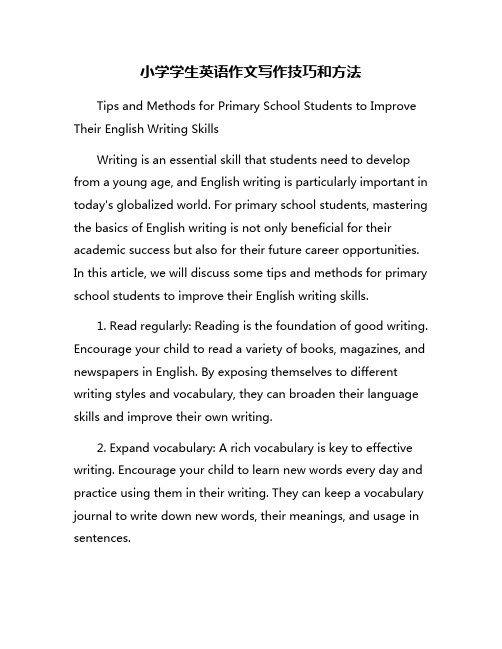
小学学生英语作文写作技巧和方法Tips and Methods for Primary School Students to Improve Their English Writing SkillsWriting is an essential skill that students need to develop from a young age, and English writing is particularly important in today's globalized world. For primary school students, mastering the basics of English writing is not only beneficial for their academic success but also for their future career opportunities. In this article, we will discuss some tips and methods for primary school students to improve their English writing skills.1. Read regularly: Reading is the foundation of good writing. Encourage your child to read a variety of books, magazines, and newspapers in English. By exposing themselves to different writing styles and vocabulary, they can broaden their language skills and improve their own writing.2. Expand vocabulary: A rich vocabulary is key to effective writing. Encourage your child to learn new words every day and practice using them in their writing. They can keep a vocabulary journal to write down new words, their meanings, and usage in sentences.3. Practice writing regularly: Like any skill, writing requires practice. Encourage your child to write regularly, whether it is in the form of daily journal entries, short stories, essays, or letters. Set aside some time each day for writing practice.4. Focus on grammar and punctuation: Good grammar and punctuation are essential for clear and effective writing. Encourage your child to pay attention to grammar rules and punctuation marks such as commas, periods, and quotation marks. Practice grammar exercises and proofread their writing for errors.5. Plan and organize ideas: Before starting to write, encourage your child to plan and organize their ideas. They can create an outline or mind map to structure their writing and ensure it flows logically from one point to the next.6. Use descriptive language: Encourage your child to use descriptive language in their writing to create vivid images in the reader's mind. Encourage them to use sensory details such as sight, sound, smell, taste, and touch to make their writing more engaging.7. Seek feedback: Encourage your child to seek feedback on their writing from teachers, parents, or peers. Constructivefeedback can help them identify areas for improvement and refine their writing skills.8. Revise and edit: Revision and editing are crucial steps in the writing process. Encourage your child to revise their writing for clarity, coherence, and accuracy. They can also edit their work for spelling, grammar, and punctuation errors.9. Use writing prompts: Writing prompts can inspire your child to write about different topics and engage their creativity. Encourage them to use writing prompts to practice their writing skills and explore new ideas.10. Be patient and persistent: Developing strong writing skills takes time and effort. Encourage your child to be patient and persistent in their practice, and celebrate their progress along the way.In conclusion, improving English writing skills is a valuable investment for primary school students. By following these tips and methods, students can develop their writing skills and become more confident and proficient writers. With practice and dedication, primary school students can unlock their full potential and excel in English writing.。
小学如何写英语作文的方法和技巧

小学如何写英语作文的方法和技巧How to Write English Compositions in Primary SchoolWriting English compositions can be a challenging task for primary school students, especially those who are just beginning to learn the language. However, with some guidance and practice, students can develop the skills needed to write coherent and engaging compositions. In this article, we will discuss some methods and techniques that can help primary school students improve their English composition writing.1. Plan Before You WriteBefore starting to write your composition, it is important to plan out what you want to say. This can help you organize your thoughts and ensure that your composition has a clear structure. You can start by brainstorming ideas for your composition and then creating an outline that includes an introduction, body paragraphs, and a conclusion. Planning ahead can save you time and make the writing process more efficient.2. Use Simple and Clear LanguageWhen writing compositions, it is important to use simple and clear language that is appropriate for your level of English proficiency. Avoid using complicated vocabulary and complexsentence structures that might confuse the reader. Instead, focus on using words and phrases that you are familiar with and that convey your ideas clearly. Remember that simplicity is key when it comes to writing effective compositions.3. Practice Grammar and PunctuationGrammar and punctuation are essential components of writing in English. Make sure to review the basic rules of grammar and punctuation, such as subject-verb agreement, tenses, and sentence structure. Pay special attention to punctuation marks such as commas, periods, and apostrophes, as they can change the meaning of your sentences. Practice writing sentences with correct grammar and punctuation to improve your writing skills.4. Use Descriptive LanguageTo make your compositions more interesting and engaging, try using descriptive language to paint a vivid picture for the reader. Use adjectives and adverbs to describe people, places, and events in your composition. Show, don't tell - instead of simply stating facts, use descriptive language to evoke emotions and create a memorable reading experience for your audience.5. Edit and Revise Your WorkAfter you have finished writing your composition, take the time to edit and revise your work. Check for spelling and grammatical errors, and make sure that your sentences are clear and concise. Look for ways to improve the flow of your composition and make sure that your ideas are presented in a logical order. Ask a teacher or parent to review your composition and provide feedback for further improvement.6. Read and Learn from ExamplesOne of the best ways to improve your English composition writing is to read and learn from examples of good writing. Read books, articles, and essays written by professional writers to get a sense of different writing styles and techniques. Pay attention to how authors structure their compositions, use language effectively, and engage the reader. By studying examples of good writing, you can improve your own writing skills and develop your own unique style.In conclusion, writing English compositions in primary school can be a rewarding and enjoyable experience. By following these methods and techniques, students can develop the skills needed to write clear, engaging, and effective compositions. Remember to plan ahead, use simple and clear language, practice grammar and punctuation, use descriptivelanguage, edit and revise your work, and read and learn from examples. With practice and perseverance, you can become a confident and skilled writer of English compositions.。
六年级下册PEP_小学生英语写作技巧 1总复习
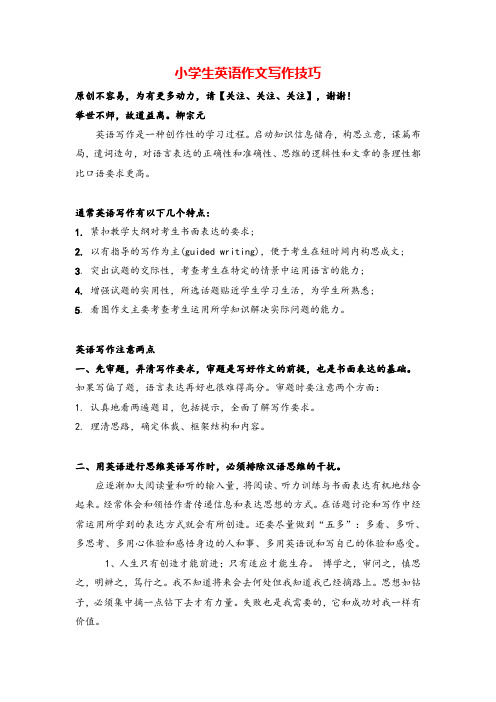
小学生英语作文写作技巧原创不容易,为有更多动力,请【关注、关注、关注】,谢谢!举世不师,故道益离。
柳宗元英语写作是一种创作性的学习过程。
启动知识信息储存,构思立意,谋篇布局,遣词造句,对语言表达的正确性和准确性、思维的逻辑性和文章的条理性都比口语要求更高。
通常英语写作有以下几个特点:1.紧扣教学大纲对考生书面表达的要求;2.以有指导的写作为主(guided writing),便于考生在短时间内构思成文;3. 突出试题的交际性,考查考生在特定的情景中运用语言的能力;4.增强试题的实用性,所选话题贴近学生学习生活,为学生所熟悉;5. 看图作文主要考查考生运用所学知识解决实际问题的能力。
英语写作注意两点一、先审题,弄清写作要求,审题是写好作文的前提,也是书面表达的基础。
如果写偏了题,语言表达再好也很难得高分。
审题时要注意两个方面:1. 认真地看两遍题目,包括提示,全面了解写作要求。
2. 理清思路,确定体裁、框架结构和内容。
二、用英语进行思维英语写作时,必须排除汉语思维的干扰。
应逐渐加大阅读量和听的输入量,将阅读、听力训练与书面表达有机地结合起来。
经常体会和领悟作者传递信息和表达思想的方式。
在话题讨论和写作中经常运用所学到的表达方式就会有所创造。
还要尽量做到“五多”:多看、多听、多思考、多用心体验和感悟身边的人和事、多用英语说和写自己的体验和感受。
1、人生只有创造才能前进;只有适应才能生存。
博学之,审问之,慎思之,明辨之,笃行之。
我不知道将来会去何处但我知道我已经摘路上。
思想如钻子,必须集中摘一点钻下去才有力量。
失败也是我需要的,它和成功对我一样有价值。
2、为了做有效的生命潜能管理,从消极变为积极,你必须了解人生的最终目的。
你到底想要什么?一生中哪些对你而言是最重要的?什么是你一生当中最想完成的事?或许,你从来没有认真思量过生命潜能管理旧是以有系统的方法管理自我及周边资源,达成。
小学英语写作训练中的写作技巧

小学英语写作训练中的写作技巧在小学英语学习中,写作是培养学生语言表达能力和创造力的重要环节。
通过写作训练,学生可以提高语言表达能力、加深对单词和语法的理解,并从中体会到写作的乐趣。
本文将介绍一些小学英语写作训练中的写作技巧,帮助学生们提高写作水平。
一、选择适合的话题在写作训练中,选择适合的话题对于学生的写作发展至关重要。
话题应该能够激发学生的兴趣,同时又与他们的生活经验相关。
例如,可以选择关于家庭、校园、节日、假期等主题,让学生能够发挥自己的想象力和创造力。
二、扩展词汇量写作过程中,丰富的词汇量能够让文章表达更加准确、丰富。
因此,扩展词汇量是小学英语写作训练中的重要一环。
学生可以通过阅读英语故事、文章、课外书籍等途径来扩展词汇量。
同时,老师也可以设计一些词汇扩展的练习,如使用词汇卡片、词汇游戏等,使学生在愉快的氛围中学习新词汇。
三、明确文章结构一个清晰的文章结构能够让读者更好地理解内容。
学生在写作训练中,应该提前规划好文章的结构。
一般来说,文章可以分为引言、正文和结尾三部分。
引言部分可以概括出文章要讨论的主题,正文部分可以对主题进行展开,结尾部分可以总结全文或表达自己的观点。
四、运用适当的句子结构句子结构的多样化可以使文章更有吸引力。
在写作训练中,学生应该尝试使用简单句、并列句、复合句等不同的句子结构,以增加文章的变化性和层次感。
同时,学生还需注意使用适当的连词,如and、but、because等,来连接不同的句子,使文章更流畅。
五、注意语法和拼写正确的语法和拼写是写作训练中不能忽视的重要方面。
学生在写作时,应该注意主谓一致、时态一致等语法规则,并避免出现常见的拼写错误。
老师可以通过练习题、批改作文等方式帮助学生纠正错误,提高写作质量。
六、培养自检和修改的习惯在写作训练中,学生应该培养自检和修改的习惯。
写完文章后,学生可以自己检查一遍,看是否有语法错误或不通顺的地方。
然后,可以请同学或老师帮忙修改作文,提出改进意见。
六下写作文的技巧英语
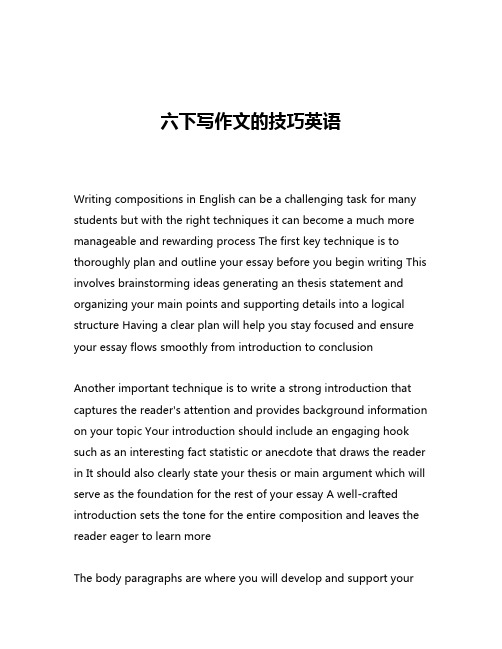
六下写作文的技巧英语Writing compositions in English can be a challenging task for many students but with the right techniques it can become a much more manageable and rewarding process The first key technique is to thoroughly plan and outline your essay before you begin writing This involves brainstorming ideas generating an thesis statement and organizing your main points and supporting details into a logical structure Having a clear plan will help you stay focused and ensure your essay flows smoothly from introduction to conclusionAnother important technique is to write a strong introduction that captures the reader's attention and provides background information on your topic Your introduction should include an engaging hook such as an interesting fact statistic or anecdote that draws the reader in It should also clearly state your thesis or main argument which will serve as the foundation for the rest of your essay A well-crafted introduction sets the tone for the entire composition and leaves the reader eager to learn moreThe body paragraphs are where you will develop and support yourthesis statement Each body paragraph should focus on one main idea or argument and include specific examples evidence and analysis to back it up Effective body paragraphs use topic sentences to introduce the main point transition words and phrases to connect ideas and concluding sentences to summarize the key points Remember to maintain a formal academic tone throughout your writing and avoid using first-person pronouns like I and meCrafting compelling body paragraphs is crucial but it's equally important to write a strong conclusion that reinforces your thesis and leaves a lasting impression on the reader Your conclusion should summarize the main points of your essay without simply repeating information verbatim It may also include a call to action a prediction about the future or a thought-provoking final statement that encourages the reader to continue reflecting on the topicIn addition to strong planning and organization effective writing also requires attention to language and style Using varied sentence structures and a diverse vocabulary can make your writing more engaging and sophisticated Incorporating relevant quotes from outside sources can also lend credibility to your arguments and demonstrate your understanding of the topic at hand However it's important not to overuse quotes or let them overshadow your own analysisFinally proofreading and editing are essential steps in the writing process that should not be overlooked Even the most well-planned and thoughtfully written essay can be undermined by careless errors in grammar spelling and punctuation Take the time to carefully review your work identify and correct any mistakes and ensure that your writing is polished and professional-looking before submitting itIn conclusion writing effective English compositions requires mastering a variety of techniques from planning and outlining to crafting compelling body paragraphs and conclusions By following these six key steps you can develop the skills necessary to produce high-quality essays that communicate your ideas clearly and persuasively This will not only help you succeed in your academic pursuits but also serve you well in any professional or personal writing you may undertake in the future。
pep版六年级下册英语作文一般字数要求
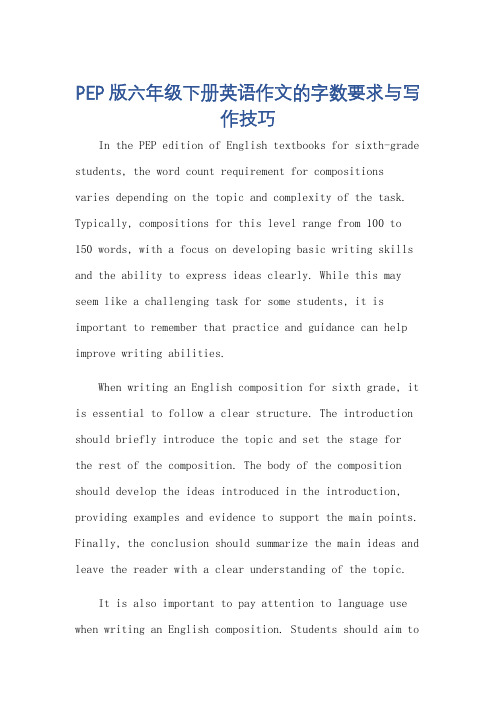
PEP版六年级下册英语作文的字数要求与写作技巧In the PEP edition of English textbooks for sixth-grade students, the word count requirement for compositions varies depending on the topic and complexity of the task. Typically, compositions for this level range from 100 to 150 words, with a focus on developing basic writing skills and the ability to express ideas clearly. While this may seem like a challenging task for some students, it is important to remember that practice and guidance can help improve writing abilities.When writing an English composition for sixth grade, it is essential to follow a clear structure. The introduction should briefly introduce the topic and set the stage for the rest of the composition. The body of the composition should develop the ideas introduced in the introduction, providing examples and evidence to support the main points. Finally, the conclusion should summarize the main ideas and leave the reader with a clear understanding of the topic. It is also important to pay attention to language use when writing an English composition. Students should aim touse a variety of vocabulary and sentence structures to express their ideas. They should avoid using simple or repetitive language and strive to make their writing as interesting and engaging as possible.To help students meet the word count requirement while maintaining the quality of their writing, teachers can provide guidance and feedback on their compositions. They can encourage students to brainstorm ideas before writing, helping them to generate a richer and more diverse range of content. Additionally, teachers can provide examples of well-written compositions to help students understand what makes a good piece of writing.By following these tips and practicing regularly, students can improve their writing skills and meet the word count requirement for PEP edition sixth-grade English compositions. With continued effort and dedication, they can develop into confident and competent writers.**PEP版六年级下册英语作文字数要求与写作技巧** 在PEP版六年级下册英语教材中,作文的字数要求会根据主题和任务的复杂程度而有所不同。
六下英语作文写做技巧
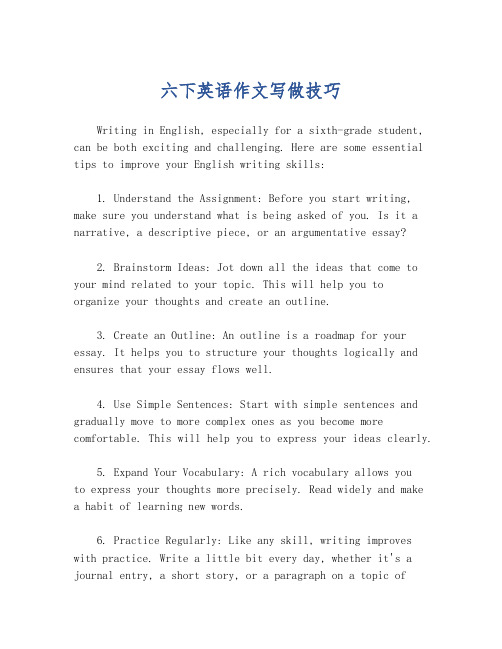
六下英语作文写做技巧Writing in English, especially for a sixth-grade student, can be both exciting and challenging. Here are some essential tips to improve your English writing skills:1. Understand the Assignment: Before you start writing, make sure you understand what is being asked of you. Is it a narrative, a descriptive piece, or an argumentative essay?2. Brainstorm Ideas: Jot down all the ideas that come to your mind related to your topic. This will help you toorganize your thoughts and create an outline.3. Create an Outline: An outline is a roadmap for your essay. It helps you to structure your thoughts logically and ensures that your essay flows well.4. Use Simple Sentences: Start with simple sentences and gradually move to more complex ones as you become more comfortable. This will help you to express your ideas clearly.5. Expand Your Vocabulary: A rich vocabulary allows youto express your thoughts more precisely. Read widely and make a habit of learning new words.6. Practice Regularly: Like any skill, writing improves with practice. Write a little bit every day, whether it's a journal entry, a short story, or a paragraph on a topic ofinterest.7. Edit and Revise: After you finish writing, take some time to read through your work. Look for grammatical errors, awkward phrasing, and areas where your ideas could be clearer.8. Get Feedback: Don't be afraid to ask for help. Teachers, parents, or peers can provide valuable feedbackthat can help you improve.9. Use Descriptive Language: To make your writing more engaging, use adjectives and adverbs to paint a picture with your words.10. Read Good Writing: Reading well-written books, articles, and essays can inspire you and teach you how to construct sentences and develop arguments.Remember, writing is a personal expression of yourthoughts and ideas. Don't be afraid to let your unique voice shine through your writing. Happy writing!。
六下英语作文写作技巧
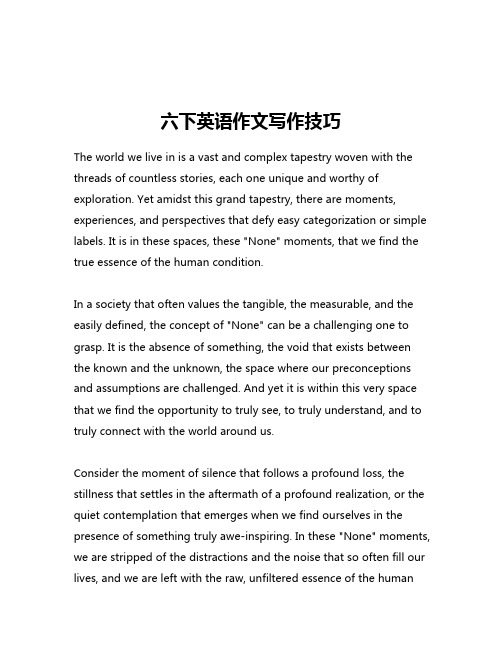
六下英语作文写作技巧The world we live in is a vast and complex tapestry woven with the threads of countless stories, each one unique and worthy of exploration. Yet amidst this grand tapestry, there are moments, experiences, and perspectives that defy easy categorization or simple labels. It is in these spaces, these "None" moments, that we find the true essence of the human condition.In a society that often values the tangible, the measurable, and the easily defined, the concept of "None" can be a challenging one to grasp. It is the absence of something, the void that exists between the known and the unknown, the space where our preconceptions and assumptions are challenged. And yet it is within this very space that we find the opportunity to truly see, to truly understand, and to truly connect with the world around us.Consider the moment of silence that follows a profound loss, the stillness that settles in the aftermath of a profound realization, or the quiet contemplation that emerges when we find ourselves in the presence of something truly awe-inspiring. In these "None" moments, we are stripped of the distractions and the noise that so often fill our lives, and we are left with the raw, unfiltered essence of the humanexperience.It is in these moments that we are forced to confront the deepest questions of our existence, the ones that defy easy answers and demand a level of introspection and self-reflection that can be both daunting and transformative. What is the meaning of life? What is the nature of consciousness? How do we find purpose and fulfillment in a world that can often feel cold and indifferent?These are the questions that haunt us, that drive us, and that ultimately shape the course of our lives. And it is in the "None" moments, the spaces between the noise and the chaos, that we have the opportunity to grapple with these questions and to find the answers that resonate most deeply within us.But the "None" moments are not just about the profound and the existential. They are also about the simple, the mundane, and the everyday. It is in the quiet moments of contemplation, the uninterrupted stretches of time where we are free to let our minds wander and our thoughts flow, that we find the space to truly appreciate the beauty and wonder of the world around us.It is in these "None" moments that we can marvel at the intricate patterns of a snowflake, the gentle sway of a tree branch in the breeze, or the subtle interplay of light and shadow that dancesacross a wall. It is in these moments that we can truly connect with the natural world, to feel a sense of belonging and interconnectedness that transcends the boundaries of our own individual existence.And it is in these "None" moments that we can also find the space to connect with one another, to truly see and be seen, to share in the common experiences that bind us together as human beings. It is in the silences between the words, the pauses in the conversation, that we can glimpse the deeper truths that lie within each of us, the vulnerabilities and the fears, the hopes and the dreams that make us who we are.In a world that is increasingly fast-paced, hyper-connected, and filled with distractions, the "None" moments have become increasingly rare and precious. They are the oases of calm in a sea of chaos, the moments of clarity in a world that can often feel overwhelming and confusing.And yet it is in these "None" moments that we find the greatest opportunities for growth, for self-discovery, and for true connection. It is in these spaces that we can let go of the masks and the facades that we so often wear and embrace the raw, authentic essence of our own being.So let us embrace the "None" moments, the spaces between the noise and the chaos, and let them guide us on a journey of self-discovery and understanding. Let us use these moments to connect with the world around us, to find meaning and purpose in the simple and the profound, and to deepen our connections with one another. For it is in these "None" moments that we can truly find the essence of what it means to be human.。
小学六年级英语写作技巧的提升方法

小学六年级英语写作技巧的提升方法在小学六年级的英语写作过程中,提升写作技巧是每位学生的重要任务。
通过培养一些有效的方法,可以帮助学生们在写作上取得显著进步。
让我们一起探索那些能够使写作变得更加生动和有趣的技巧吧。
首先,构建一个清晰的写作框架是成功的关键。
在写作之前,学生们可以先制定一个大纲,理清思路。
这一步就像为一座建筑物打下坚实的地基。
一个简单的框架可以包括引言、正文和结尾。
在引言部分,学生们可以简要介绍话题或背景;在正文中,细致地展开主要内容,并通过具体例子进行说明;最后,在结尾部分,总结主要观点,并提出自己的看法或感受。
其次,丰富的词汇量可以让写作更加生动有趣。
学生们可以通过阅读各种英语书籍、文章和故事来增加词汇量。
遇到不熟悉的单词时,鼓励他们使用词典查找词义,并尝试在写作中使用这些新学到的词汇。
除此之外,记笔记也是一个有效的方法,将学到的新词汇和短语记录下来,并在实际写作中加以运用。
此外,良好的语法和句型结构是写作的基础。
学生们应该掌握基本的语法规则,如时态、主谓一致、句子结构等。
可以通过做一些语法练习题,或者请教老师来解决在语法使用上遇到的问题。
在句型方面,鼓励学生们使用多样的句式,如简单句、复合句和复杂句,以增加文章的层次感和丰富性。
另一个重要的技巧是学习如何进行有效的修改和编辑。
初稿完成后,学生们可以将其放置一段时间,然后再进行审阅。
这时,他们应该检查拼写错误、语法问题以及句子的流畅性。
此外,可以请同学或老师帮忙审阅,获得反馈并进行改进。
通过不断的修改和完善,学生们的写作水平会逐渐提高。
创造力和表达力也是提升写作技巧的关键。
学生们可以通过写日记、创作小故事或进行角色扮演来锻炼自己的创意和表达能力。
在写作中,尝试运用比喻、拟人等修辞手法,使文章更加生动和形象。
记住,写作不仅仅是表达思想,更是展示个人风格和独特视角的机会。
此外,定期阅读优质的英语写作作品,可以帮助学生们了解不同的写作风格和技巧。
小学六年级英语作文写作技巧分析
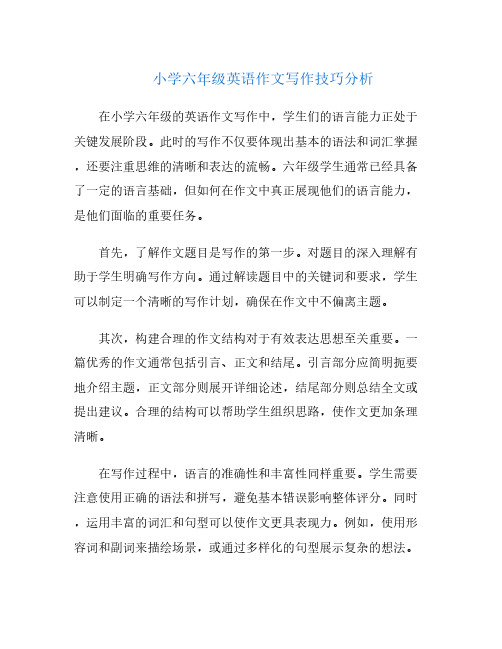
小学六年级英语作文写作技巧分析在小学六年级的英语作文写作中,学生们的语言能力正处于关键发展阶段。
此时的写作不仅要体现出基本的语法和词汇掌握,还要注重思维的清晰和表达的流畅。
六年级学生通常已经具备了一定的语言基础,但如何在作文中真正展现他们的语言能力,是他们面临的重要任务。
首先,了解作文题目是写作的第一步。
对题目的深入理解有助于学生明确写作方向。
通过解读题目中的关键词和要求,学生可以制定一个清晰的写作计划,确保在作文中不偏离主题。
其次,构建合理的作文结构对于有效表达思想至关重要。
一篇优秀的作文通常包括引言、正文和结尾。
引言部分应简明扼要地介绍主题,正文部分则展开详细论述,结尾部分则总结全文或提出建议。
合理的结构可以帮助学生组织思路,使作文更加条理清晰。
在写作过程中,语言的准确性和丰富性同样重要。
学生需要注意使用正确的语法和拼写,避免基本错误影响整体评分。
同时,运用丰富的词汇和句型可以使作文更具表现力。
例如,使用形容词和副词来描绘场景,或通过多样化的句型展示复杂的想法。
为了提高写作水平,学生还需注重逻辑性和连贯性。
每一段落应围绕一个中心思想展开,各段落之间的过渡应自然流畅。
使用连接词如“however”(然而)、“furthermore”(此外)等,可以有效地增强作文的连贯性。
此外,写作前的思考和规划同样关键。
学生可以先用草稿记录下主要的观点和论据,然后逐步扩展细节和例子。
这种方法不仅有助于清晰表达想法,还能减少最终写作中的错误。
学生们在写作时,也可以借鉴优秀范文。
通过分析范文中的语言运用、结构安排和表达方式,学生可以更好地理解如何在自己的作文中应用这些技巧。
然而,要注意避免照搬范文,保持写作的独特性和个人风格。
在写作的最后阶段,仔细检查和修改是提升作文质量的关键步骤。
通过审阅作文中的语法错误、拼写错误和逻辑问题,学生可以进一步优化自己的写作。
教师和同学的反馈也能提供宝贵的意见,帮助学生发现并改正不足之处。
PEP版六年级英语下册 小学英语写作技巧(附写作话题) 精品
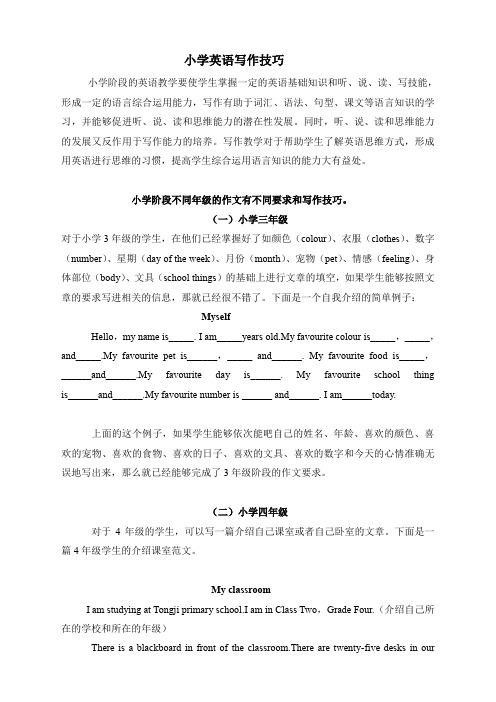
小学英语写作技巧小学阶段的英语教学要使学生掌握一定的英语基础知识和听、说、读、写技能,形成一定的语言综合运用能力,写作有助于词汇、语法、句型、课文等语言知识的学习,并能够促进听、说、读和思维能力的潜在性发展。
同时,听、说、读和思维能力的发展又反作用于写作能力的培养。
写作教学对于帮助学生了解英语思维方式,形成用英语进行思维的习惯,提高学生综合运用语言知识的能力大有益处。
小学阶段不同年级的作文有不同要求和写作技巧。
(一)小学三年级对于小学3年级的学生,在他们已经掌握好了如颜色(colour)、衣服(clothes)、数字(number)、星期(day of the week)、月份(month)、宠物(pet)、情感(feeling)、身体部位(body)、文具(school things)的基础上进行文章的填空,如果学生能够按照文章的要求写进相关的信息,那就已经很不错了。
下面是一个自我介绍的简单例子:MyselfHello,my name is_____. I am_____years old.My favourite colour is_____,_____,and_____.My favourite pet is______,_____ and______. My favourite food is_____,______and______.My favourite day is______. My favourite school thing is______and______.My favourite number is ______ and______. I am______today.上面的这个例子,如果学生能够依次能吧自己的姓名、年龄、喜欢的颜色、喜欢的宠物、喜欢的食物、喜欢的日子、喜欢的文具、喜欢的数字和今天的心情准确无误地写出来,那么就已经能够完成了3年级阶段的作文要求。
(二)小学四年级对于4年级的学生,可以写一篇介绍自己课室或者自己卧室的文章。
闽教版六下英语小学生英语写作技巧 2公开课教案课件知识点梳理
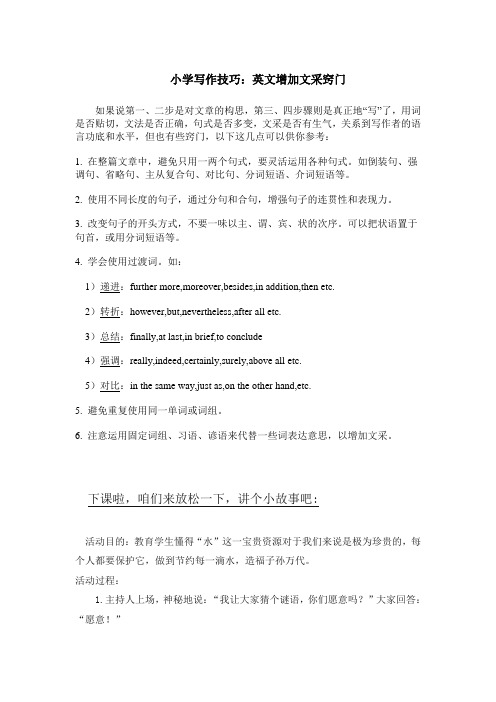
小学写作技巧:英文增加文采窍门如果说第一、二步是对文章的构思,第三、四步骤则是真正地“写”了,用词是否贴切,文法是否正确,句式是否多变,文采是否有生气,关系到写作者的语言功底和水平,但也有些窍门,以下这几点可以供你参考:1. 在整篇文章中,避免只用一两个句式,要灵活运用各种句式。
如倒装句、强调句、省略句、主从复合句、对比句、分词短语、介词短语等。
2. 使用不同长度的句子,通过分句和合句,增强句子的连贯性和表现力。
3. 改变句子的开头方式,不要一味以主、谓、宾、状的次序。
可以把状语置于句首,或用分词短语等。
4. 学会使用过渡词。
如:1)递进:further more,moreover,besides,in addition,then etc.2)转折:however,but,nevertheless,after all etc.3)总结:finally,at last,in brief,to conclude4)强调:really,indeed,certainly,surely,above all etc.5)对比:in the same way,just as,on the other hand,etc.5. 避免重复使用同一单词或词组。
6. 注意运用固定词组、习语、谚语来代替一些词表达意思,以增加文采。
活动目的:教育学生懂得“水”这一宝贵资源对于我们来说是极为珍贵的,每个人都要保护它,做到节约每一滴水,造福子孙万代。
活动过程:1.主持人上场,神秘地说:“我让大家猜个谜语,你们愿意吗?”大家回答:“愿意!”主持人口述谜语:“双手抓不起,一刀劈不开,煮饭和洗衣,都要请它来。
”主持人问:“谁知道这是什么?”生答:“水!”一生戴上水的头饰上场说:“我就是同学们猜到的水。
听大家说,我的用处可大了,是真的吗?”主持人:我宣布:“水”是万物之源主题班会现在开始。
水说:“同学们,你们知道我有多重要吗?”齐答:“知道。
六下写作文的技巧英语
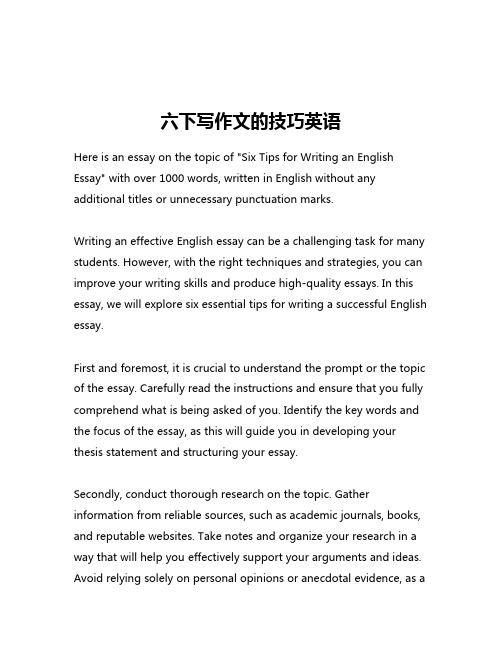
六下写作文的技巧英语Here is an essay on the topic of "Six Tips for Writing an English Essay" with over 1000 words, written in English without any additional titles or unnecessary punctuation marks.Writing an effective English essay can be a challenging task for many students. However, with the right techniques and strategies, you can improve your writing skills and produce high-quality essays. In this essay, we will explore six essential tips for writing a successful English essay.First and foremost, it is crucial to understand the prompt or the topic of the essay. Carefully read the instructions and ensure that you fully comprehend what is being asked of you. Identify the key words and the focus of the essay, as this will guide you in developing your thesis statement and structuring your essay.Secondly, conduct thorough research on the topic. Gather information from reliable sources, such as academic journals, books, and reputable websites. Take notes and organize your research in a way that will help you effectively support your arguments and ideas. Avoid relying solely on personal opinions or anecdotal evidence, as awell-researched essay will carry more weight and credibility.The third tip is to develop a strong thesis statement. Your thesis statement should be a clear and concise statement that outlines the main argument or focus of your essay. It should be specific and debatable, as a strong thesis statement will provide a solid foundation for the rest of your essay. Ensure that your thesis statement is directly related to the prompt and that it guides the direction of your essay.Next, plan and organize your essay. Create an outline that includes an introduction, body paragraphs, and a conclusion. In the introduction, provide background information on the topic and clearly state your thesis statement. In the body paragraphs, present your arguments and supporting evidence in a logical and coherent manner. Finally, in the conclusion, summarize your main points and reaffirm your thesis statement.The fifth tip is to use appropriate language and tone. Avoid using overly casual or colloquial language, and instead, aim for a more formal and academic style. Use precise and descriptive vocabulary, and ensure that your writing is clear and concise. Additionally, maintain a consistent tone throughout your essay, as this will help to create a cohesive and polished piece of writing.Lastly, proofread and edit your essay. Take the time to carefully review your work, checking for any grammatical errors, spelling mistakes, or inconsistencies. Consider seeking feedback from your teacher or a peer, as they may be able to provide valuable insights and suggestions for improvement. Remember, the editing process is an essential part of the writing process, and it can help you to refine and strengthen your essay.In conclusion, writing an effective English essay requires a combination of careful planning, thorough research, and attention to detail. By following these six tips – understanding the prompt, conducting research, developing a strong thesis statement, planning and organizing your essay, using appropriate language and tone, and proofreading and editing – you can improve your writing skills and produce high-quality essays that effectively communicate your ideas and arguments. Remember, practice and persistence are key to becoming a strong essay writer, so keep writing and refining your skills.。
- 1、下载文档前请自行甄别文档内容的完整性,平台不提供额外的编辑、内容补充、找答案等附加服务。
- 2、"仅部分预览"的文档,不可在线预览部分如存在完整性等问题,可反馈申请退款(可完整预览的文档不适用该条件!)。
- 3、如文档侵犯您的权益,请联系客服反馈,我们会尽快为您处理(人工客服工作时间:9:00-18:30)。
小学写作技巧:英文增加文采窍门(英语作文写作技巧)
如果说第一、二步是对文章的构思,第三、四步骤则是真正地“写”了,用词是否贴切,文法是否正确,句式是否多变,文采是否有生气,关系到写作者的语言功底和水平,但也有些窍门,以下这几点可以供你参考:
1.在整篇文章中,避免只是用一两个句式,要灵活运用各种句式。
如倒装句、强调句、省略句、主从复合句、对比句、分词短语、介词短语等。
2.使用不同长度的句子,通过分句和合句,增强句子的连贯性和表现力。
3.改变句子的开头方式,不要一味以主、谓、宾、状的次序。
可以把状语置于句首,或用分词短语等。
4.学会使用过渡词。
如:
1)递进:further more,moreover,besides,in addition,then etc.
2)转折:however,but,nevertheless,after all etc.
3)总结:finally,at last,in brief,to conclude
4)强调:really,indeed,certainly,surely,above all etc.
5)对比:in the same way,just as,on the other hand,etc.
5.避免重复使用同一单词或词组。
6.注意运用固定词组、习语、谚语来代替一些词表达意思,以增加文采。
